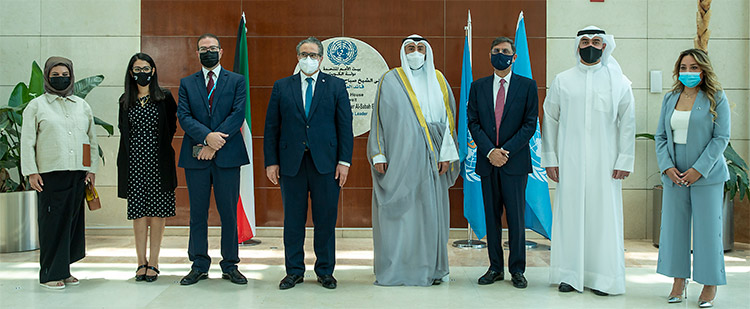
Kuwait City/Cairo/Geneva, 15 June 2021 – The World Health Organization (WHO) today opened a country office in Kuwait in a move set to strengthen its presence and cooperation with the Government to advance the health and well-being of the country’s population. The newly established office will enable WHO to work on the ground with national health authorities, United Nations partners and a range of stakeholders in all sectors to foster public health collaboration at the national, regional and international levels.
H.E. the Minister of Health of Kuwait Dr Bassel Humoud Hamad Al-Sabah formally opened WHO’s new premises in Kuwait City in a ceremony that was attended virtually by WHO's Director-General Dr Tedros Adhanom Ghebreyesus and WHO's Regional Director for the Eastern Mediterranean Dr Ahmed Al-Mandhari, as well as the United Nations Resident Coordinator in Kuwait Dr Tarek El-Sheikh, and WHO’s Representative in Kuwait, Dr Assad Hafeez, who attended in person.
Kuwait has long been an influential and strategic Member State and partner for WHO in the Eastern Mediterranean Region and beyond. Kuwait was one of the first countries to respond to WHO’s COVID-19 appeal, and provided crtitical support to the global and regional response to the pandemic. Kuwait’s Ministry of Health has been leading a well-coordinated multisectoral response to the pandemic within the country and has strengthened national capacity across all levels of government.
“The inauguration of the WHO country office in Kuwait comes at a critical time as the world faces unprecedented challenges due to COVID-19 and its effects on health care systems worldwide,” noted H.E. Dr Bassel Humoud Hamad Al-Sabah. “This requires strengthening of international solidarity and cooperation to enable us at the country level to share experiences and lessons learned in the fields of surveillance, preparedness, prevention and response to COVID-19.”
“Kuwait is one of the world’s largest humanitarian donors and is among WHO’s top 20 donors. We greatly value this support,” said WHO Director-General Dr Tedros. “WHO’s mission is to promote health, keep the world safe and serve the vulnerable – and that is what we will work for in Kuwait, as we do in every country. Kuwait has many achievements to be proud of in health in each of these 3 areas.”
WHO’s Regional Director Dr Ahmed Al-Mandhari said that enhancing national and regional collaboration with Kuwait was a major priority. “Kuwait has historically been a generous supporter of WHO causes and initatives, especially in the context of emergency response, and has always provided its support where and when it is most needed. We are most grateful for this partnership. The inauguration of this new country office will further advance our collaboration and bring us even closer towards achieving our vision of Health for All by All in the Eastern Mediterranean Region.”
The opening of the Kuwait office reflects the critical importance of close contact with states and governments in WHO’s work. Country offices represent a link between the Organization and governments. The WHO Regional Office for the Eastern Mediterranean Region comprises 22 countries and territories, and WHO has offices in most of them: the opening of the Kuwait office brings the number of WHO country offices in the Region to 19. WHO country offices play a key role within the Organization in ensuring appropriate WHO technical cooperation with countries and leadership in the health sector. Functions of country offices include policy advice and technical support, information, public relations and advocacy, and management and administration.
“As a partner and advocate of WHO’s mandate, Kuwait has always upheld the guiding principle of the United Nations Charter to "leave no one behind" through enabling the provision of life-saving interventions to affected communities,” said the United Nations Resident Coordinator in Kuwait, Dr Tarek El-Sheikh. “In doing so, Kuwait has supported United Nations agencies, funds and programmes to protect access rights to essential preventive and curative care for millions of vulnerable people.”
Reaffirming WHO’s aim to provide support to the Kuwaiti Ministry of Health, Dr Assad Hafeez, WHO Representative in Kuwait, commented: “We are looking forward to working closely with the Kuwaiti government and all stakeholders, especially the United Nations family, to advance the health and well-being of the population in Kuwait. I have the privilege of being the first WHO Representative in Kuwait and I am committed to exerting all efforts to support the Ministry of Health and other sectors in their endeavours to achieve national and global health goals, including in the response to COVID-19 pandemic.”


